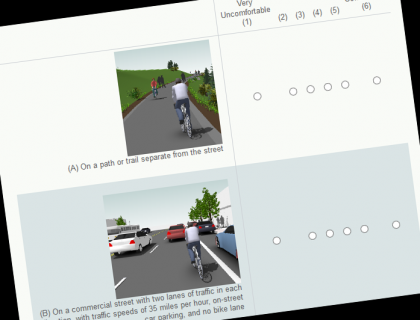Last month, we reported that local academics were polling people in Portland’s newest protected bike lane to learn who likes it, who doesn’t, and if or how it’s changing people’s behavior.
Now, it’s the Internet’s turn. You, too, can now take the 20-minute online survey about NE Multnomah Street between Wheeler and 16th avenues.
“After conducting targeted ‘intercepts’ of bicyclists on NE Multnomah (you may have received a postcard invitation from us already), we are now opening the survey up to get as much feedback as possible,” Portland State University’s Chris Monsere writes on the survey page. “Hearing from bicyclists like yourself is a very important part of this study, and we hope you will participate. We will share our findings with the Portland Bureau of Transportation and hope that the results will help in future plans for improving bicycling in cities around the United States.”
This survey, dubbed the “Neighborhood Street Study” asks detailed questions about how people use NE Multnomah, what they think about it, and how it compares to other types of bikeway facilities.
The city has already been gathering traffic information, finding that bike traffic on Multnomah is up 15 percent in the protected lanes’ first year. But traffic isn’t everything. It’s useful for the study to find out more about who’s riding and why.
Separated from autos by a wide strip of beeswax yellow paint, a few parking spots, some plastic bollards and a set of concrete planters, Multnomah Street’s protected bikeway was the signature bike project from former Sam Adams staffer Tom Miller’s brief stint running the Portland Bureau of Transportation. It’s now part of a six-city study of how protected bike lanes are working.
The research is funded by People For Bikes’ Green Lane Project (full disclosure: I also work for People For Bikes; but we cover them only at Jonathan’s request) and by the Oregon Transportation Research and Education Consortium.

